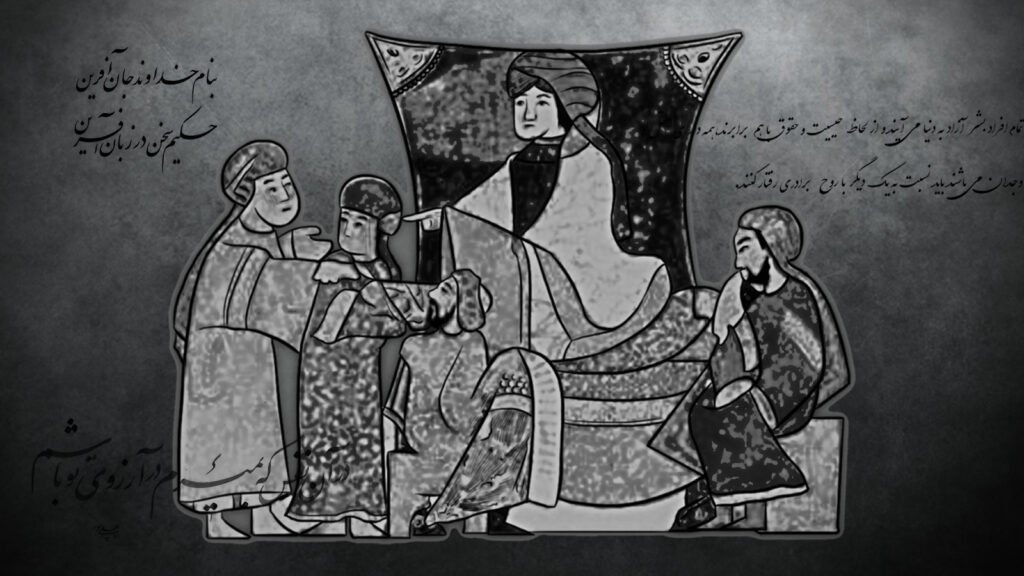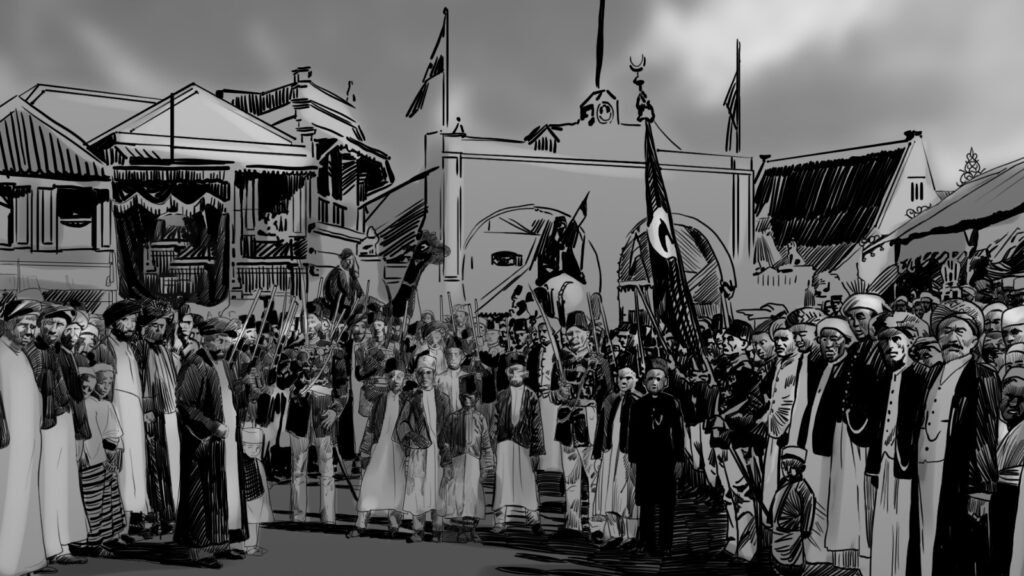Human interests have clashed since ancient times, and nothing stands in the way of these interests except violence or the coercive power of a higher authority, which may be a moral conscience, societal norms, or legal authority. Without a system of rules and standards applied impartially to everyone, chaos ensues, leading society into a destructive turmoil seen in situations of security breakdowns or civil wars.
Definition of Law
Al-Maani’s website mentions that the linguistic origin of the Arabic word “Qanoon” is the Greek word “canon,” which means the measure of everything.
William Blackstone says in his book Commentaries on the Law of Englan (1765), “Law, in its most general and comprehensive sense, signifies a rule of action; and is applied indiscriminately to all kinds of action, whether animate or inanimate, rational or irrational. Thus, we say, the laws of motion, of gravitation of optics or mechanics, as well as the laws of nature and nations. And it is that rule of action prescribed by some superior, which the inferior is bound to obey”.
In his book A Definition of Law (1926), Hugh Evander Willis says, “Law is a scheme of social control, backed and sanctioned by the power of the state, for the protection of social interests, by means of legal capacities and legal redress.”
Therefore, the law is considered a set of general rules that regulate the behaviour and relationships of individuals within a society. Violating these rules results in appropriate penalties. We need law because humans live within a surrounding culture, and society cannot function properly without a system and binding rules. These rules guide individuals’ behaviour, govern their relationships, and resolve any conflicts that may arise among them.
The emergence of laws accompanied the development of humanity and evolved with social, economic, religious, and political advancements. Current legal systems refine previous systems, and contemporary systems cannot be understood without referring to their historical origins.
Legal Thought Trends
Legal thought is divided into two directions when determining the origin of law. The first direction is the formal approach, which links the law’s origin to the state’s. Proponents of this view believe that there is no law without the state, as the state is the entity that issues laws, and the rules that existed in primitive societies were social rules that preceded legal rules.
The second direction is the substantive approach. Proponents of this view believe that the law originated independently of the state and accompanied the development of society. In other words, law emerged before the state as a product of social and economic conditions.
Based on this latter approach, law emerged and evolved with the development of society, adapting over the ages to suit each era, passing through several stages since its inception.

Stages of Legal Development
The Stage of Power in the Primitive Ages: There was no law in the known sense; instead, society was governed by traditions or a mere sense of rights and duties defined by the power that protected them.
Individuals within the community would take revenge if they were attacked. They would use force to defend their property or honour, as the force was the only available means due to the absence of authority.
Over time, humans abandoned the principle of force, turning to alternative means such as arbitration to resolve disputes and ostracizing the offender by expelling him from the community as a form of discipline.
As noted by Ubaid Al-Fatlawi in his book History of Law (1998), the second stage of legal evolution is the stage of religious traditions. With the advancement of human societies and the dominance of spiritual perspectives, a class of clergy emerged to whom people turned for arbitration in their disputes, fearing the wrath of the Creator. This gave the law a sacred rigour that was not subject to modification.
The third stage of legal evolution shifted towards customary traditions. As life evolved, humans developed a set of rules to regulate relationships within society. These rules were not derived from religious precepts but from the customs and traditions that community members had come to recognize and follow.
Custom consists of two elements: one is material, which is the continuous application of the rule in practice, and the other is moral, which is the people’s belief in the necessity of obeying this rule because it aligns with justice. If the ethical element is absent, the rule becomes a habit, but if it is present, it becomes a custom.
The fourth and final stage in the development of law is the stage of codification. After the invention of writing, humans began documenting legal rules to disseminate them among people and to preserve them from loss and oblivion.
Among the ancient legal codes in the East are the old Iraqi codes, such as the Code of Ur-Nammu, the Code of Ishtar, the Code of Eshnunna, the Code of Hammurabi, and other Assyrian and Babylonian laws.
Ancient Egyptian laws include the Laws of Thoth, the Orders of King Menes, and the Code of King Bocchoris, which is one of the most famous Egyptian laws and remained in effect until the Roman conquest of Egypt.
Among the most famous legal codes in the West are the Greek laws, including the laws of Athens, notably the legislations of Draco and Solon. Several laws emerged in the Greek city of Sparta, and some believe that Sparta’s strength lasted for two hundred years due to its respect for the rules. In Rome, the Law of the Twelve Tables appeared.
Roman law is considered one of the most famous ancient legal systems due to its precision, abundant documents, and ease of studying. As a result, it is still taught in most universities worldwide.

With the advent and spread of Islam across most parts of the world, Islamic legislation emerged. This religion did not confine itself to creed, ethics, and worship but also paid attention to social relationships, including personal status and financial transactions. It encompasses marriage, divorce, lineage, inheritance, wills, and more rules.
In his book “History of Law,” Fattalawi pointed out that these legislative rules stem from two primary sources: the Quran and the Sunnah (Prophetic traditions). Other sources, such as consensus (Ijma) and analogy (Qiyas), followed. Thus, Islamic law established a comprehensive legal system that rivals and even surpasses the most robust legal systems in the world.
In Qawl Fassel magazine, writer Mohamed Shaaban Ayub discusses in his article
In modern times, the branches of law have diversified due to the rapid development and complexity of relationships between individuals, leading to several legal trends.
Legal Trends
The Anglo-Saxon approach, which focuses on the economic aspects of individual relationships, is currently applied in the United States, Canada, and England.
The second approach is the Latin approach, which focuses on the parties involved in the relationship governed by law. This approach is currently applied in France, Belgium, Spain, and Italy.
It is worth noting that Islamic jurisprudence played a role in shaping French law itself. The French historian Gustave Le Bon mentioned in his book “The Civilization of the Arabs” that when Napoleon returned to France from Egypt in 1801, he brought with him a jurisprudence book from the Maliki school of thought, titled “Sharh al-Dardir ala Mukhtasar Khalil,” written by Ahmad al-Dardir, who was born in 1715.
When Napoleon established the French Civil Code, he drew from the rulings of Islamic jurisprudence according to the Maliki school. The Arabic Digital Encyclopedia indicated that Napoleon ordered the translation of Maliki jurisprudence, specifically selecting many rulings for the Napoleonic Code code issued in 1803.
The third approach is the Islamic approach, which is currently applied in whole or in part in Islamic countries.
Islamic Sharia law was the official source of Egyptian law in general from the Islamic conquest until the era of Governor Muhammad Ali Pasha (1805-1848) when it was applied to all individuals and matters. From Muhammad Ali’s era to Khedive Ismail’s (1863-1879), French law began to infiltrate Egypt.
The application of Sharia law continued even during the period of legal reforms in the Ottoman Empire, but these laws were restructured in a more modern and organized manner. The most important laws derived from Islamic Sharia and codified modernly are the Ottoman Majalla (Majalla al-Ahkam al-Adliyyah), first issued in 1876.
Al-Fatlawi, in his book History of Law, notes that the Ottoman Majalla, derived from Islamic jurisprudence, remained in force in Iraq until civil law was issued in 1945, which replaced the Majalla starting in 1953.
The Gulf Cooperation Council (GCC) countries have worked to harmonize their laws in various fields. The journey of judicial and legal cooperation began in 1982 when the ministers commissioned a committee of specialized experts to draft unified codifications in civil, personal status, commercial, and criminal matters.
The ministers agreed on a proposal from the Kingdom of Bahrain to establish a commercial arbitration centre. They tasked a committee of specialized experts with laying the foundations for agreements among the council countries to enforce judgments.
One of the most significant achievements in this regard was the signing of the Judgment Enforcement Agreement, which stipulates that if a judicial ruling is issued in any GCC state, it is considered as if it was issued in the state where enforcement is sought, making the judicial ruling enforceable in the member states.
Among the notable achievements of the GCC in the field of law application is the issuance of the Muscat Document for the Unified Personal Status Law for GCC countries, addressing matters related to family, guardianship, wills, and inheritance.
Other achievements of the council include the issuance of the Kuwait Document for the Unified Civil Law for GCC countries, the Doha Document for the Criminal Law, the Riyadh Document for the Unified Procedures Law, the Abu Dhabi Document for the Unified Law, the Manama Document for the Unified Law for Advocacy in GCC countries, and the Muscat Document for the Unified Law for Real Estate Registration.
Legal Reflections
Apart from the history of laws and their philosophical backgrounds aimed at maintaining order through deterrent penalties, one might wonder why breaking the law results in punishment while compliance with the law does not result in a reward.
For instance, why shouldn’t they be rewarded if someone avoids committing any traffic violations for a reasonable period? For example, their driving license renewal could be free the following year.
Furthermore, the philosophy of uniform punishment for the same offence contradicts the relative differences in people’s abilities. Why should low-income individuals pay the same acceptable amount as high-income individuals?
Michael de Lamaza highlights this in his article Traffic Fines in Finland, which discusses a unique global law. Finland sets the minimum speeding fine at 20% of the offender’s monthly income.
Undoubtedly, one of the primary goals of the law is justice. Still, it is a profound philosophical concept that requires much wisdom and understanding of life’s realities and the hidden aspects of human nature.




